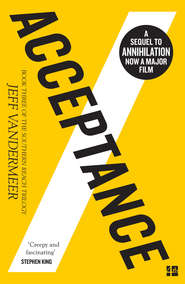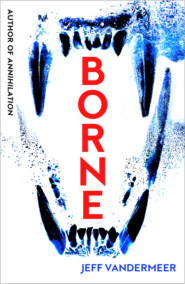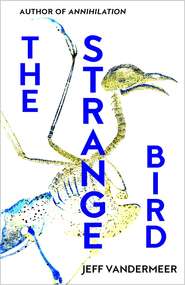По всем вопросам обращайтесь на: info@litportal.ru
(©) 2003-2024.
✖
Authority
Настройки чтения
Размер шрифта
Высота строк
Поля
He explained his thought processes. She seemed impressed, although he couldn’t really read her yet.
“Did she ever seem, during training, like she was hiding something?” he asked.
“Deflection. You think she is hiding something.”
“I don’t know yet, actually. I could be wrong.”
“We have more expert interrogators than you.”
“Probably true.”
“We should send her to Central.”
The thought made him shudder.
“No,” he said, a little too emphatically, then worried in the next split second that the assistant director might guess that he cared about the biologist’s fate.
“I have already sent the anthropologist and the surveyor away.”
Now he could smell the decay of all that plant matter slowly rotting beneath the surface of the swamp, could sense the awkward turtles and stunted fish pushing their way through matted layers. He didn’t trust himself to turn to face her. Didn’t trust himself to say anything, stood there suspended by his surprise.
Cheerfully, she continued: “You said they weren’t of any use, so I sent them to Central.”
“By whose authority?”
“Your authority. You clearly indicated to me that this was what you wanted. If you meant something else, my apologies.”
A tiny seismic shift occurred inside of Control, an imperceptible shudder.
They were gone. He couldn’t have them back. He had to put it out of his mind, would feed himself the lie that Grace had done him a favor, simplified his job. Just how much pull did she have at Central, anyway?
“I can always read the transcripts if I change my mind,” he said, attempting an agreeable tone. They’d still be questioned, and he’d given her the opening by saying he didn’t want to interview them.
She was scanning his face intently, looking for some sign that she’d come close to hitting the target.
He tried to smile, doused his anger with the thought that if the assistant director had meant him real harm, she would have found a way to spirit the biologist away, too. This was just a warning. Now, though, he was going to have to take something away from Grace as well. Not to get even but so she wouldn’t be tempted to take yet more from him. He couldn’t afford to lose the biologist, too. Not yet.
Into the awkward silence, Grace asked, “Why are you just standing out here in the heat like an idiot?” Breezily, as if nothing had happened at all. “We should go inside. It’s time for lunch, and you can meet some of the admin.”
Control was already growing accustomed to her disrespect of him, and he hated that, wanted an opportunity to reverse the trend. As he followed her in, the swamp at his back had a weight, a presence. Another kind of enemy. He’d had enough of such views, growing up nearby as a teenager after his parents’ divorce, and, again, while his father slowly died. He’d hoped to never see a swamp again.
“Just close your eyes and you will remember me.”
I do, Dad. I do remember you, but you’re fading. There’s too much interference, and all of this is becoming much too real.
Control’s father’s side of the family came originally from Central America, Hispanic and Indian; he had his father’s hands and black hair, his mother’s slight nose and height, a skin color somewhere in between. His paternal grandfather had died before Control was old enough to know him, but he had heard the epic stories. The man had sold clothespins door-to-door as a kid, in certain neighborhoods, and been a boxer in his twenties, not good enough to be a contender but good enough to be a paid opponent and take a beating. Afterward, he’d been a construction worker, and then a driving instructor, before an early death from a heart attack at sixty-five. His wife, who worked in a bakery, passed on just a year later. His eldest child, Control’s father, had grown up to be an artist in a family mostly composed of carpenters and mechanics, and used his heritage to create abstract sculptures. He had humanized the abstractions by painting over them in the bright palette favored by the Mayans and by affixing to them bits of tile and glass—bridging some gap between professional and outsider art. That was his life, and Control never knew a time that his father was not that person and only that person.
The story of how Control’s father and mother fell in love was also the happy story of how his father had risen, for a time, as a favorite in high-end art galleries. They had met at a reception for his work and, as they told it, had been enamored with each other right from the first glance, although later Control found that difficult to believe. At the time, she was based up north and had what amounted to a desk job, although she was rising fast. His father moved to be with her, and they had Control and then only a year or two later she was reassigned, from a desk job to active duty in the field, and that was the start of the end of it all, the story that anchored Control as a kid soon revealed as just a brief moment set against a landscape of unhappiness. Not unique: the kind of depressingly familiar painting you’d find in a seaside antique store but never buy.
The silence was punctuated by arguments, a silence created not just by the secrets she carried with her but by those she could not divulge, and, Control realized as an adult, by her inner reserve, which after a time could not be bridged. Her absences tore at his father, and by the time Control was ten, that was the subtext and sometimes the transcript of their dispute: She was killing his art and that wasn’t fair, even though the art scene had moved on and what his father did was expensive and required patrons or grants to sustain.
But still his father would sit there with his schematics, his plans for new work, spread out around him like evidence when she came back between field assignments. She bore the recrimination, Control remembered, with calm and a chilly, aloof compassion. She was the unstoppable force that came blowing in—not there, there—with presents bought at the last minute in far-off airports and an innocent-sounding cover story about what she’d been up to, or a less innocent story that Control realized years later, when faced with a similar dilemma, had been coming to them from a time delay. Something declassified she could now share but that had happened to her long ago. The stories, and the aloofness, agitated his father, but the compassion infuriated him. He could not read it as anything other than condescending. How can you tell if a streak of light across the sky is sincere?
When they divorced, Control went south to live with his dad, who became embedded in a community that felt comfortable because it included some of his relatives and fed his artistic ambitions even as his bank account starved. Control could remember the shock when he realized how much noise and motion and color could be found in someone’s house, once they’d moved. How suddenly he was part of a larger family.
Yet during those hot summers in that small town not very far from the Southern Reach, as a thirteen-year-old with a rusty bike and a few loyal friends, Control kept thinking about his mother, out in the field, in some far-off city or country: that distant streak of light that sometimes came down out of the night sky and materialized on their doorstep as a human being. Exactly in the same way as when they’d been together as a family.
One day, he believed, she would take him with her, and he would become the streak of light, have secrets no one else could ever know.
Some rumors about Area X were elaborate and in their complexity seemed to Control like schools of the most deadly and yet voluminous jellyfish at the aquarium. As you watched them, in their undulating progress, they seemed both real and unreal framed against the stark blue of the water. Invasion site. Secret government experiments. How could such an organism actually exist? The simple ones that echoed the official story—variations on a human-made ecological disaster area—were by contrast so commonplace these days that they hardly registered or elicited curiosity. The petting-zoo versions that ate out of your hand.
But the truth did have a simple quality to it: About thirty-two years ago, along a remote southern stretch known by some as the “forgotten coast,” an Event had occurred that began to transform the landscape and simultaneously caused a border or wall to appear. A kind of ghost or “permeable pre-border manifestation” as the files put it—light as fog, almost invisible except for a flickering quality—had quickly emanated out in all directions from an unknown epicenter and then suddenly stopped at its current impenetrable limits.
Since then, the Southern Reach had been established and sought to investigate what had occurred, with little success and much sacrifice of lives via the expeditions—sent in through the sole point of egress. Yet that loss of life was trifling compared to the possibility of some break in containment across a border that the scientists were still studying and trying to understand. The riddle of why equipment, when recovered, had been rendered nonfunctional, some of it decomposing at an incredibly fast rate. The teasing, inconsistent way in which some expeditions came back entirely unharmed that seemed almost more inexplicable.
“It started earlier than the border coming down,” the assistant director told him after lunch in his new-old office. She was all business now, and Control chose to accept her at face value, to continue to put away, for now, his anger at her preemptive strike in banishing the anthropologist and the surveyor.
Grace rolled out the map of Area X on a corner of his desk: the coastline, the lighthouse, the base camp, the trails, the lakes and rivers, the island many miles north that marked the farthest reach of the … Incursion? Invasion? Infestation? What word worked? The worst part of the map was the black dot hand-labeled by the director as “the tunnel” but known to most as “the topographical anomaly.” Worst part because not every expedition whose members had survived to report back had encountered it, even when they’d mapped the same area.
Grace tossed files on top of the map. It still struck Control, with a kind of nostalgia rarely granted to his generation, how anachronistic it was to deal in paper. But the concern about sending modern technology across the border had infected the former director. She had forbidden certain forms of communication, required that all e-mails be printed out and the original, electronic versions regularly archived and purged, and had arcane and confusing protocols for using the Internet and other forms of electronic communication. Would he put an end to that? He didn’t know yet, had a kind of sympathy for the policy, impractical though it might be. He used the Internet solely for research and admin. He believed a kind of a fragmentation had crept into people’s minds in the modern era.
“It started earlier …”
“How much earlier?”
“Intel indicates that there may have been odd … activity occurring along that coast for at least a century before the border came down.” Before Area X had formed. A “pristine wilderness.” He’d never heard the word pristine used so many times before today.
Idly, he wondered what they called it—whoever or whatever had created that pristine bubble that had killed so many people. Maybe they called it a holiday retreat. Maybe they called it a beachhead. Maybe “they” were so incomprehensible he’d never understand what they called it, or why. He’d asked the Voice if he needed access to the files on other major unexplained occurrences, and the Voice had made “No” sound like a granite cliff, with only flailing blue sky beyond it.
Control had already seen at least some of the flotsam and jetsam now threatening to buckle the desk in the file summary. He knew that quite a bit of the information peeking out at him from the beige folders came from lighthouse journals and police records—and that the inexplicable in it had to be teased out from the edges, pushed forward into the light like the last bit of toothpaste in the dehydrated tube curled up on the edge of the bathroom sink. The kind of “strange doings” alluded to by hard-living bearded fishermen in old horror movies as they stared through haunted eyes at the unforgiving sea. Unsolved disappearances. Lights in the night. Stories of odd salvagers, and false beacons, and the hundred legends that accrete around a lonely coastline and a remote lighthouse.
There had even been an informal group—the Séance & Science Brigade—dedicated to applying “empirical reality to paranormal phenomenon.” Members of the S&S Brigade had written several self-published books that had collected dust on the counters of local businesses. It was the S&SB that had in effect named Area X, identifying that coast as “of particular interest” and calling it “Active Site X”—a name prominent on their bizarre science-inspired tarot cards. The Southern Reach had discounted S&SB early on as “not a catalyst or a player or an instigator” in whatever had caused Area X—just a bunch of (un)lucky “amateurs” caught up in something beyond the grasp of their imaginations. Except, almost every effective terrorist Control had encountered was an “amateur.”
“We live in a universe driven by chance,” his father had said once, “but the bullshit artists all want causality.” Bullshit artist in this context meant his mother, but the statement had wide applications.
So was all or any of it random coincidence—or part of some vast, pre–Area X conspiracy? You could spend years wading through the data, trying to find the answer—and it looked to Control as if that’s exactly what the former director had been doing.
“And you think this is credible evidence?” Control still didn’t know how far into the mountain of bullshit the assistant director had fallen. Too far, given her natural animosity, and he wouldn’t be inclined to pull her out of it.
“Not all of it,” she conceded, a thin smile erasing the default frown. “But tracking back from the events we know have occurred since the border came down, you begin to see patterns.”
Control believed her. He would have believed Grace had she said visions appeared in the swirls of her strawberry gelato on hot summer days or in the fracturing of the ice in another of her favorites, rum-and-diet with a lime (her personnel file was full of maddeningly irrelevant details). It was in the nature of being an analyst. But what patterns had colonized the former director’s mind? And how much of that had infiltrated the assistant director? On some level, Control hoped that the mess the director had left behind was deliberate, to hide some more rational progression.
“But how is that different from any other godforsaken stretch of coast half off the grid?” There were still dozens of them all across the country. Places that were poison to real-estate agents, with little infrastructure and a long history of distrust of the government.
The assistant director stared at him in a way that made him feel uncomfortably like a middle-school student again, sent up for insolence.
“I know what you’re thinking,” she said. “Have we been compromised by our own data? The answer is: Of course. That is what happens over time. But if there is something in the files that is useful, you might see it because you have fresh eyes. So I can archive all of this now if you like. Or we can use you the way we need to use you: not because you know anything but because you know so little.”










